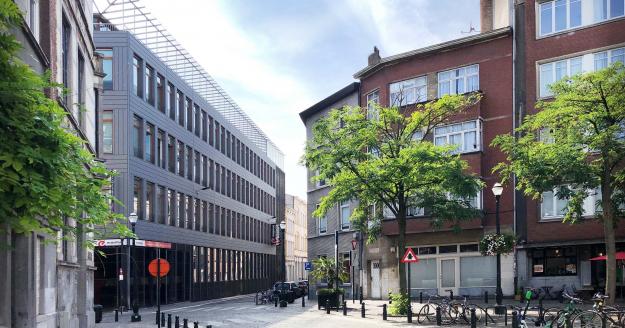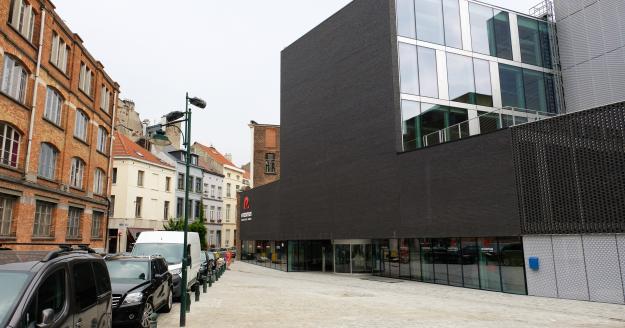
Tourism and Leisure Management
English II
In this (upper) intermediate level English-language course we explore a variety of topics related to the professional sector of tourism and leisure. We dive into English business and tourism vocabulary, figure out how to promote yourself when applying for a job and discover tourism and cultures in the USA. In this context we sharpen your language skills by consolidating your fundamental English grammar and refining your language use.
Evaluation: various evaluation forms
Extra costs: syllabus & €2
4
Cultural Encounters
In this course students discover, reflect and increase their intercultural competences. Through exercises, discussions, visits and above all, intercultural encounters with the super-diverse population in different Brussels’ neighborhoods, students raise their cultural sensitivity and awareness. Language skills and an intercultural mindset are therefore indispensable. Students realize and value the importance of good intercultural skills in the tourism sector. Through one or more self-chosen activity(ies), students demonstrate how they have further developed their intercultural attitude, skills and knowledge.
This is a mandatory subject.
Evaluation: permanent evaluation
Extra costs: € 60
4
Research and Development Project
Create a sustainable and future-oriented touristic and/or recreational product design that fits in with a given theme. Research, analysis, innovation, product development and project management are needed. You work independently, with support of digital guidelines, a coach and can consult various helpdesks along the way.
The course consists of 3 iterative phases: a research phase, a development phase and an elaboration phase.
Evaluation: 100% workpiece
Extra costs: syllabus & €21 for extra muros
12
Human Resources Management
The course ‘Human Resources Management in the Hospitality Industry’ aims at introducing the students to the HR function in a hotel. Moreover this last year’s Bachelor course focusses on taking up leadership and supervision in their future managerial jobs.
Apart from the administrative aspects of the HRM cycle (selecting, recruiting, training, rewarding and promoting staff until the exit management), the attention goes to the soft skills students should develop in order to manage their own career as well as the career of colleagues. Practical examples and testimonies from professionals are shared and exercises for the students are woven all through the course.
The HRM course teaches how to motivate a multicultural workforce in a fascinating business with all nowadays challenges linked to it.
Evaluation: 100% written evaluation
5
Digital Tools
In this course unit, students learn to use digital tools in concrete professional contexts through six different group assignments.
The following topics are covered:
- Presentations
- Surveying
- Video editing
- Route planning
- Webinars
- Graphic design
Evaluation: permanent evaluation
4
Urban Trends & Issues
More information coming soon!
4
Meetings Industry
Gatherings have been a part of people’s lives since the earliest recorded history. Nowadays, the MICE market / business events market - or the ‘meetings industry’ as it is generally called - represents a significant proportion of domestic and international tourism in many destinations. The meetings industry is one of the main pillars of tourism, both economically (added value through continuous employment and seasonal independence), as social (input sector for many small and medium-sized tourist enterprises – PCOs, DMCs, ...).
This course is an introduction to the sector and its stakeholders.
The focus is both national (with particular attention to Brussels/Belgium), as international.
Evaluation: 100% written exam
Extra costs: excursion(s) in Belgium
4
Survival Dutch
The aim of the "Survival Dutch" course is to master the basics of the Dutch language, both written and spoken. Starting from everyday situations, you will learn the necessary grammar and vocabulary in order to function in a Dutch speaking environment.
We strongly recommend incoming students to participate in the Survival Dutch course, organized prior to the start of the semester.
3
Presentation Skills
With the internationalisation of study programsme, more and more presentations are given in English. No matter how spectacular a project or its the findings, they only become relevant when they have been shared with others. A project is not finished until the results have been published or presented. In this course, we discuss general presentation techniques - e.g. how to use body language, the voice, and visual aids - and we give tips and hints on how to prepare and structure a presentation.
3
Futures Studies
How does one orient itself towards the future -or should we say futures-, in an ever-changing world? Through participation in a hands-on futures research project related to your area of expertise, you will gain a better understanding on how to navigate future worlds. Together we will learn how to give meaning to the many changes unfolding around us and empower you to actively co-create more sustainable futures for all.
At the end of the course you will understand the relevance of futures research for your specific work context and have gained a ‘futures literacy’ skillset which allows you to think about the future in a more rich, resilient, systemic and creative way.
Evaluation: Portfolio
4
(A Guide to) Navigating the World of AI
Artificial Intelligence or AI is a buzzword today and remains a concept poorly understood, vague, and often approached with fear of the unknown or with false hopes about what can be achieved. The course "Navigating the world of Artificial Intelligence" aims to introduce non-IT students to some of the basic concepts, principles, and techniques that fall under the umbrella term AI and offers a more nuanced understanding on the topic. This course is specifically designed for students with no technical background. This is not a coding course! Instead this is an introductory course that enables students to think critically, creatively and ethically about the implementation of AI technology.
Through exercises, you will be encouraged to investigate the general impact of AI in your own field to then further conceptualize what that could mean for a specific organization within your field. The students are guided through these exercises via online course material and regular discussions with peers.
4
French 1
More information coming soon!
3
Contact
Address
Erasmushogeschool Brussel
Campus Bloemenhof
Zespenningenstraat 70, 1000 Brussels
Campus Kanal
Slotstraat 28, 1000 Brussel
Contact for Erasmus students
Erasmus Coordinator Tourism and Leisure Management: leila.ouahab@ehb.be
International Office: international.office@ehb.be
International Office - Coordinator for incoming students: karen.laleeuwe@ehb.be






